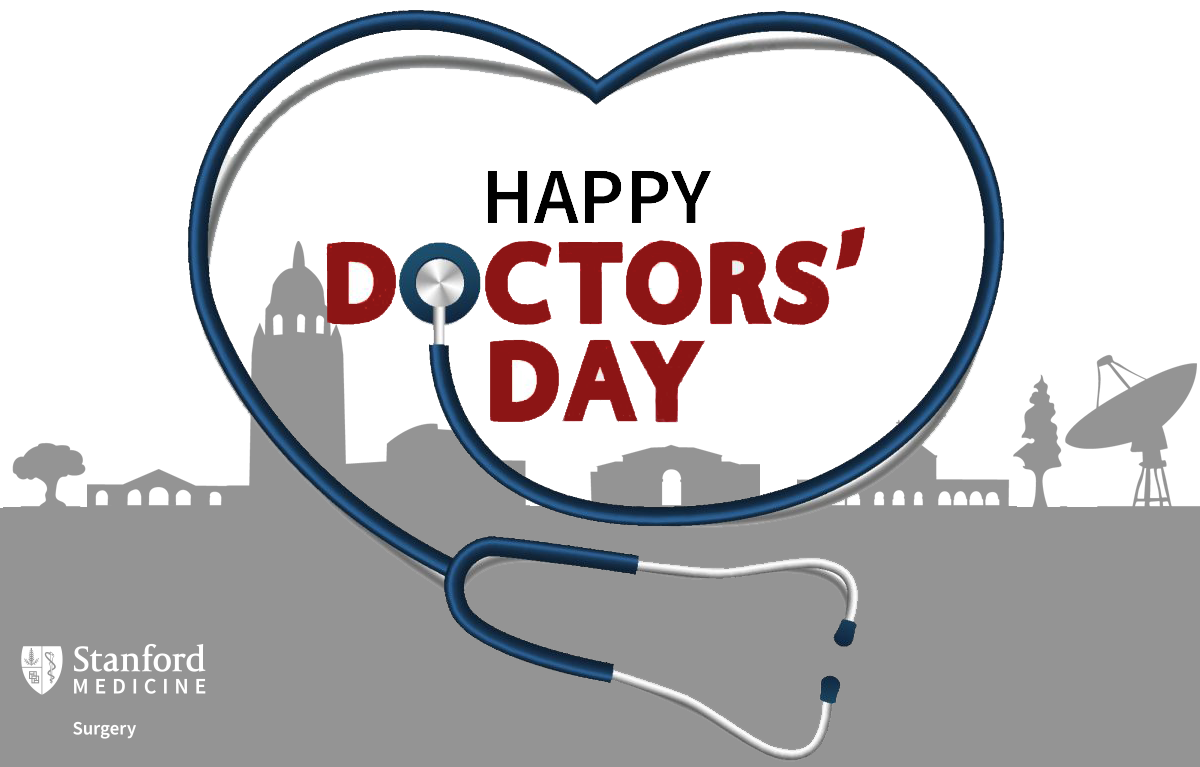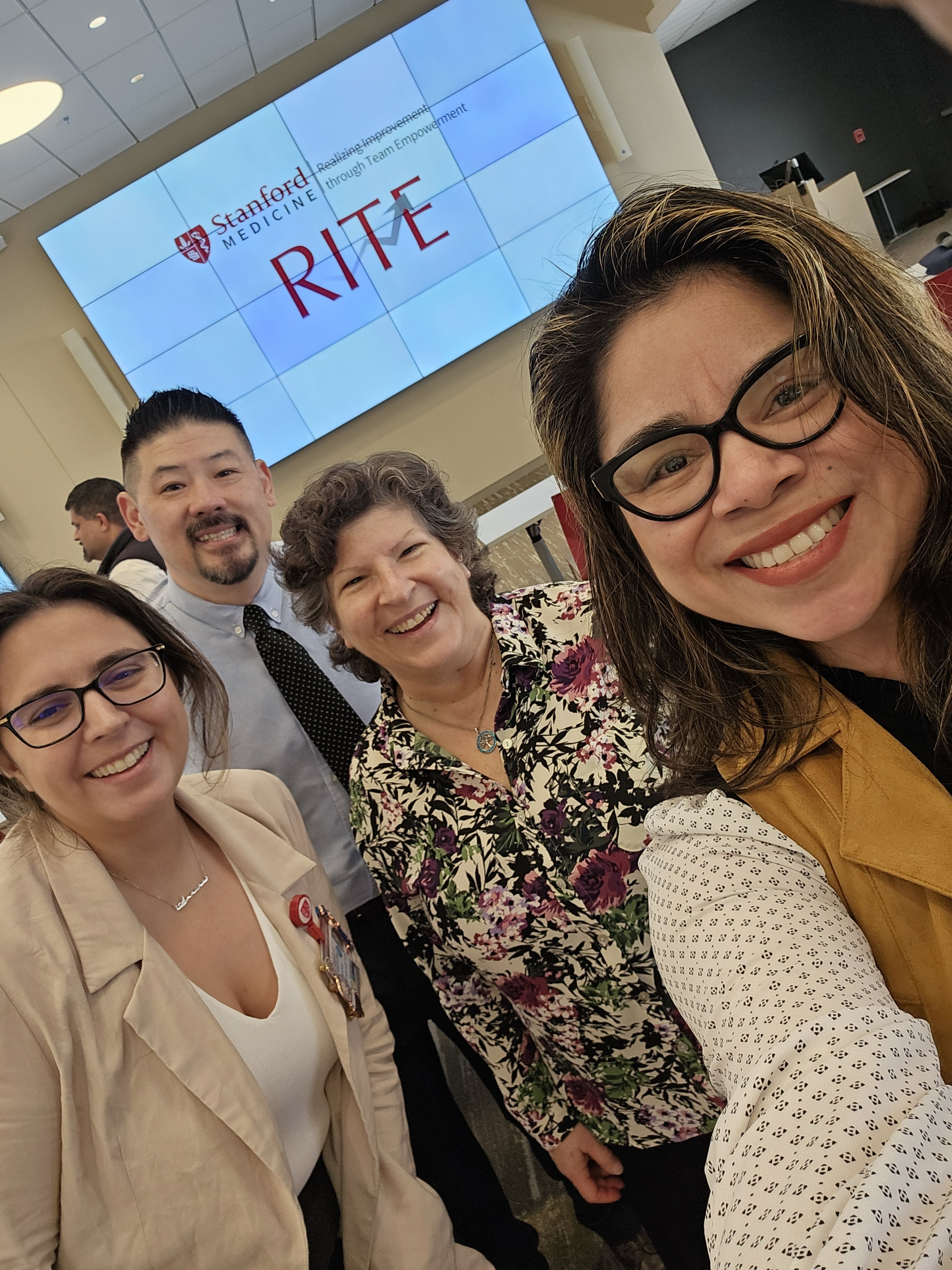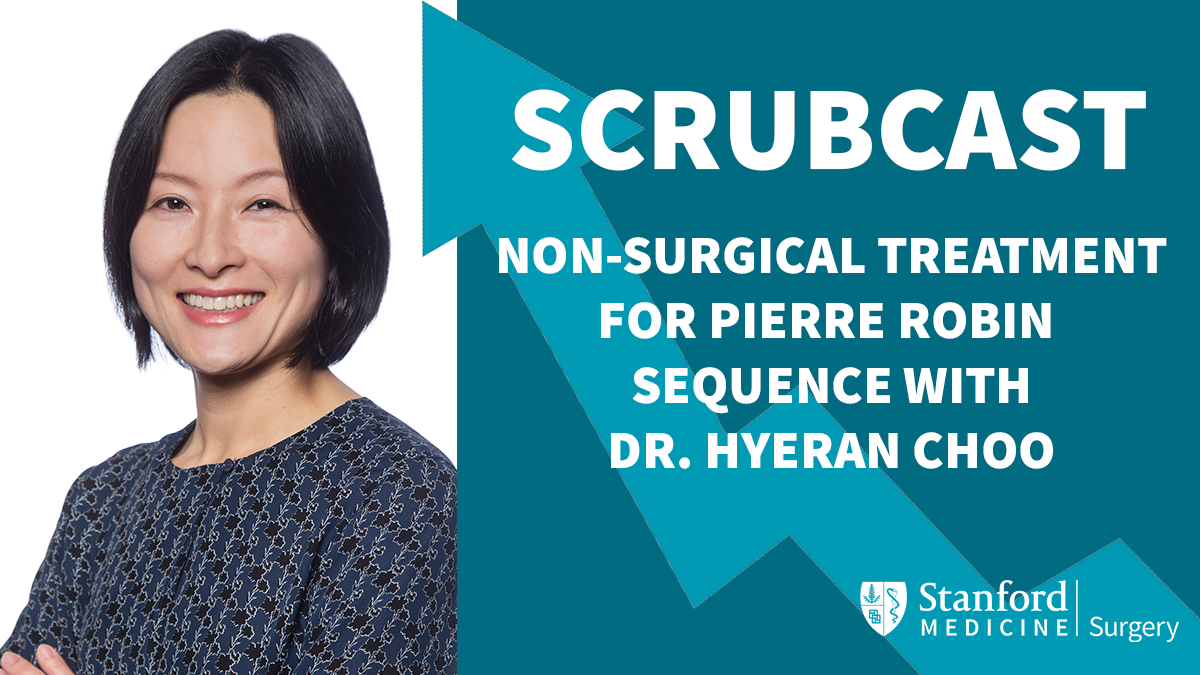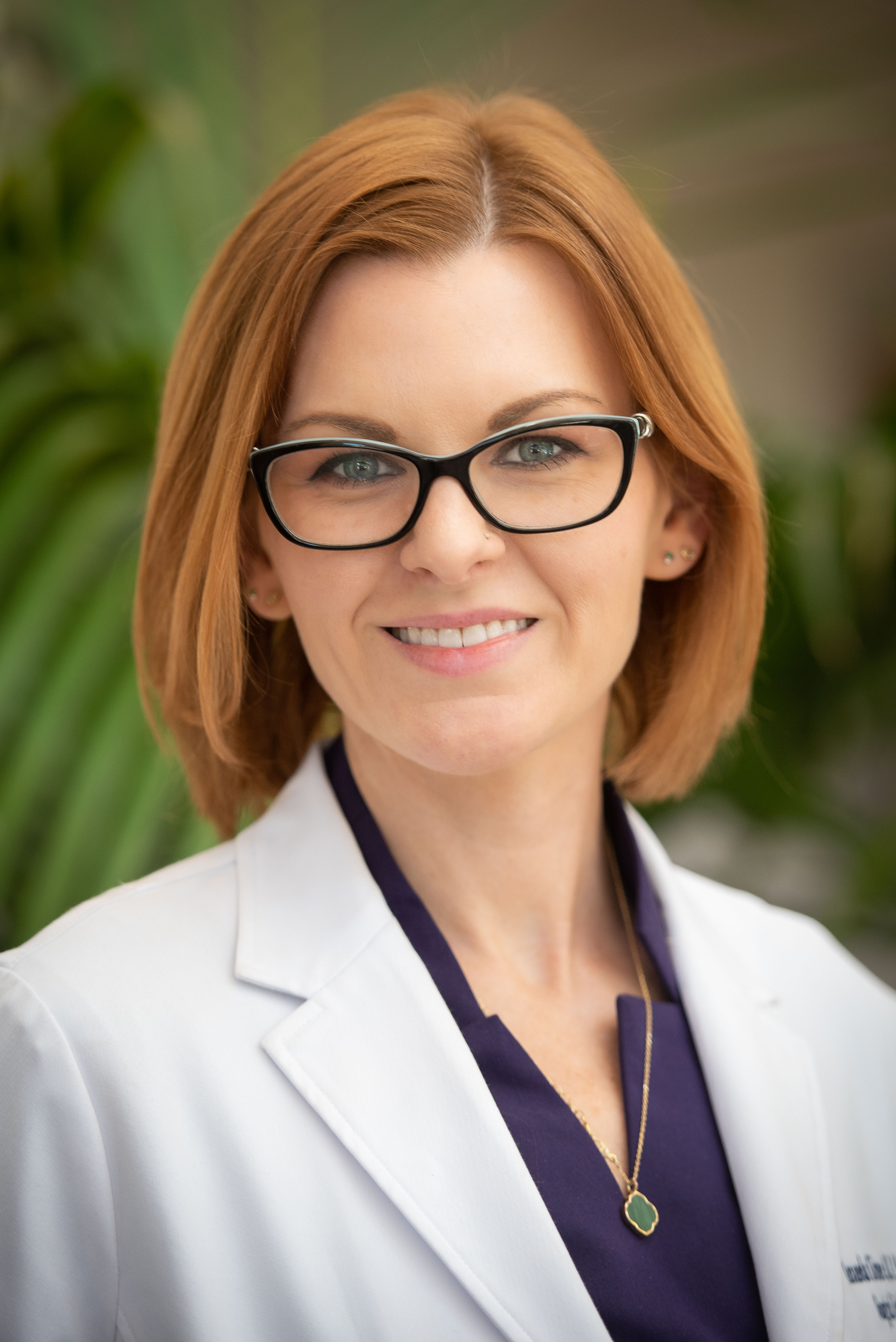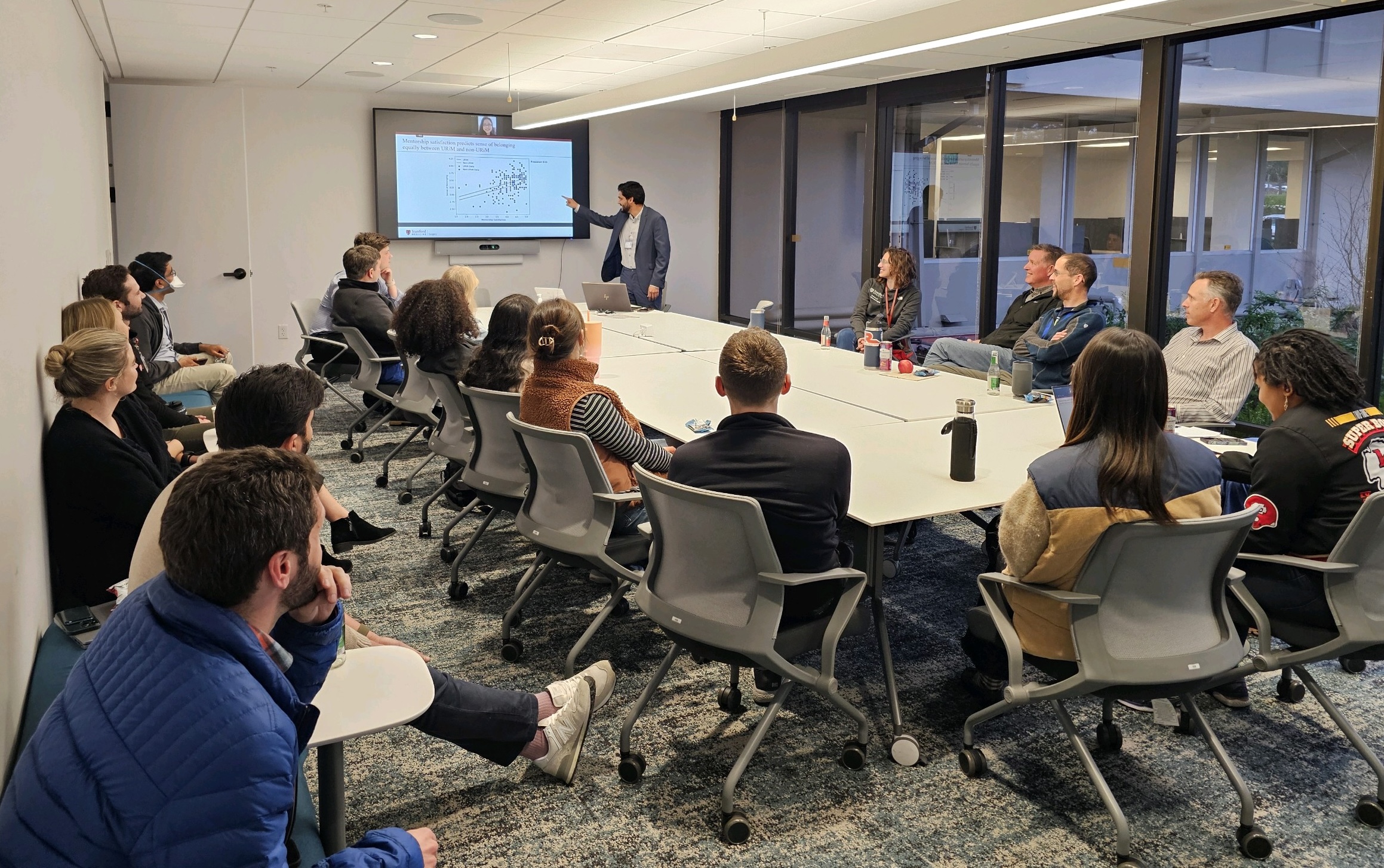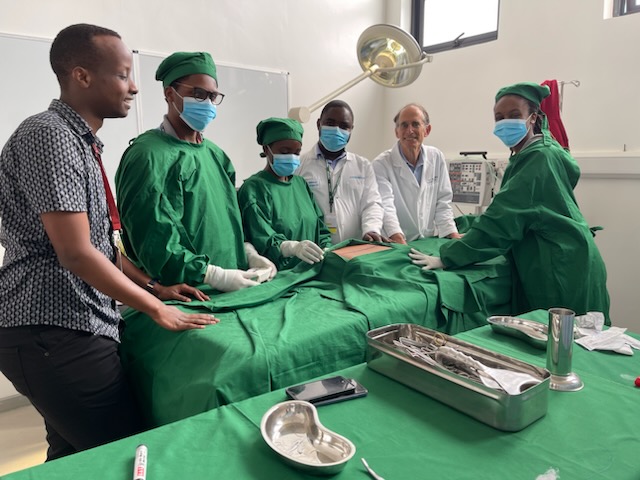JEDI Action Committee Hosts Staff Mixer
May 30, 2023
Members of General Surgery, Vascular Surgery, and Surgical Operations gather at the Staff Mixer.
Stanford Surgery’s JEDI Action Committee sponsored a lunch-time mixer for department administrative staff on Tuesday, May 23, 2023. We sat down with Committee Head Ani Gevorkian to find out more about the event and how it was planned.
Rachel Baker: Why did you decide to host a mixer for the staff?
Ani Gevorkian: Our department has grown a lot over the past few months so we wanted to give everyone an opportunity to meet the new staff members as well as interact and network with people outside their division.
RB: People tend to stick to their silos even when given the opportunity to branch out. How did you configure the event’s agenda to compensate?
AG: Yes! One problem we wanted to avoid was having people stick with the group they already knew so everyone was assigned a group randomly via a number on their name tag. We had 10 large tables set up with a different ice breaker style questions on each table. We gave participants 2-3 minutes at each table to answer the question and then they rotated through the tables, creating new conversations and meeting people from all the divisions. Our JEDI Action Committee worked together to come up with the questions.
RB: I heard about lunch! This was one of the food vendors you found during the Culturally-Inclusive Food Fairs?
AG: Yes! We got BBQ with cornbread and mac and cheese from Yes – Lilli Mae’s House of Soul Food in Oakland & Crunch Cakes! We think it is important to highlight local, minority-owned businesses with our events. We want home-grown, authentic cuisines from all over the world. It gives the businesses a chance to promote themselves on a larger scale while also allowing our staff, faculty and trainees an opportunity to learn about different cultures through food made by local, authentic businesses.
RB: Sounds delicious! Do you think the event accomplished what you set out to do and how do you know?
AG: Yes, from my own perspective. I had a chance to talk to some of the attendees who said they were excited to meet new peers and people who could serve as a resource. However, we are going to send out a more formal survey.
RB: What advice would you give someone thinking about creating a similar event?
AG: 1) Start early. I’m an outliner. I make a lot of outlines and spreadsheets.
2) Delegate. Our JEDI committee worked together to plan the event and handle everything the day-of.
3) Double and triple check everything but realize that something will go haywire the day of the event. You have to be flexible for change. For us it was not anticipating the trickle-in of guests so we swapped lunch with the game and it all worked out.
If you have questions about how to plan your own DEI event like this one, email Ani Gevorkian at agevork@stanford.edu
Special thanks to the entire JEDI Action Committee: Cynthia Moreau, Sam Gebregziabher, Tamara Winston, Michael Frazier, Ivette Arenas, Julia Miranda, Robin Foote, Mariya Ratkutko, April Leyson, Christine Reyes, Santos, Jasmin Freitas, Stephanie Edelman, and Maria Eugenia Smith.
Media Contact
Bio
About Stanford Surgery
The Stanford University Department of Surgery is dedicated to inventing the future of surgical care through:
• pioneering cutting-edge research,
• developing the next generation of leaders, and
• healing through incomparable surgical skills and compassion.
To learn more, please visit surgery.stanford.edu
The Latest
- Global Health
Meet Dr. Derbew Fikadu Berhe, University of Global Health Equity researcher, educator, and pharmacologist - Global Health
Dr. Berhe will be at Stanford April 23-27 for a mixed methods research training and hopes to connect with colleagues in global health research, pharmacology, and noncommunicable diseases. His trip is sponsored by Stanford Surgery's Office of Global Engagement.
- Surgery
Surgery Expands National Doctor Day to a Month-long Celebration
Although National Doctor’s Day officially took place on March 30, Stanford Surgery celebrated department faculty all month-long with a series of events.
- Healthier, Happy Lives Blog
How a Social Media Post Led a Teen to Find a ‘Kidney Buddy’ for Life
Jaxon was diagnosed with nephronophthisis, a genetic disorder of the kidneys. Children who have this disease need a kidney transplant by the time they’re teenagers, as it eventually leads to kidney failure.
- Healthier, Happy Lives Blog
New Liver Gives a Toddler a Renewed Chance at Life
“Ocean was in dire need of a liver transplant,” says Carlos Esquivel, MD, pediatric transplant surgeon. “He was very ill and running out of time to wait for a compatible pediatric donor. We rarely get a pediatric donor. We had an offer for him from an adult donor that was his only chance for survival. We were able to use a small segment of the donated liver to save his life.”
- Surgery
Team Reduces Reimbursement Rejections by A Third
A team comprised of Linda Thomas, Co-Lead Carmen LoCascio as well as Robin Cohen, Amos Lam, Kevin Lee, Ana Mezynski, and Jackie Stahl participated in SHC's RITE (Realizing Improvement through Team Empowerment) Program and successfully reduced reimbursement rejections from 25 to 17%.
- Surgery
Non-Surgical Treatment for Pierre Robin Sequence with Dr. HyeRan Choo
In this episode of Scrubcast, host Rachel Baker interviews Dr. HyeRan Choo, a clinical associate professor in the Division of Plastic and Reconstructive Surgery. Dr. Choo is doing innovative work treating Pierre Robin Sequence—a rare congenital condition—using a non-surgical method.
- Surgery
Kirane et al Receive MRA Team Science Award
A team including Dr. Amanda Kirane has been awarded the Melanoma Research Alliance (MRA) Team Science Award for their translational therapy-predictive organoid model.
- Stanford Health Library
StoryCorps at SHC: Carlie Arbaugh
Carlie Arbaugh (32) talks about her experience as a general surgery resident living with a rare diagnosis that has caused hearing impairment. Carlie shares how her personal experience undergoing has influenced the way she communicates with and cares for her patients.
- Surgery
SoM/GSE Fellowship Pilot Program
Dr. Jim Korndorffer created a fellowship program linking Stanford's School of Medicine with its Graduate School of Education in an effort to improve medical education (and, by extension, patient care.) The fellows are currently wrapping up the first-year pilot.
- Surgery
🌍 Spotlight: Martin Bronk
Dr. Martin Bronk recently visited UGHE in Rwanda for three weeks to teach senior medical students during their surgery clerkship.

